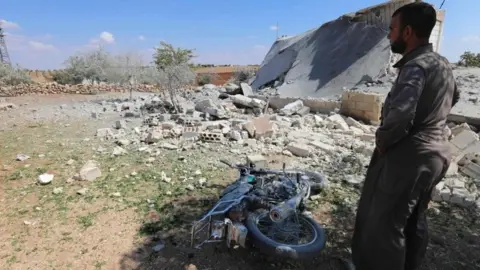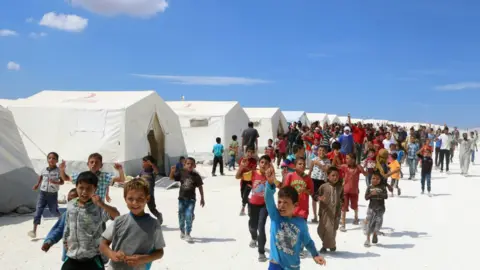Syria war: Idlib rebels targeted by 'fiercest raids in weeks'
 AFP
AFPSyria and Russia have carried out their most intensive air raids in weeks on rebel positions in the northern province of Idlib, activists say.
They say strikes targeted eastern and southern parts of Idlib, as well as the bordering province of Hama.
It is the last major rebel-held area in Syria and government forces, backed by Russia, are poised to attack.
On Friday the leaders of Russia and Iran rejected calls for a truce despite fears of a humanitarian disaster.
On Saturday the UK-based Syrian Observatory for Human Rights (SOHR), a monitoring body, and the opposition-affiliated Idlib Media Centre said government helicopters had dropped 19 barrel bombs on targets in Idlib and northern Hama, and Russian warplanes had staged 68 strikes.
The SOHR said that the raids were the "most violent and heaviest" since 10 August. Four civilians, including two children, were killed in just two strikes in southern Idlib, it said.
Why is Idlib important?
It is the last stronghold of the rebels and jihadists who have fought the Syrian authorities for the past seven years.
Idlib straddles major highways across Syria and if it is retaken by the government, the rebels would be left with just a few isolated pockets of territory.
The province is not controlled by a single group, but by a number of rival factions, including a jihadist alliance linked to al-Qaeda, and a rival National Liberation Front which is backed by Turkey.

Up to 30,000 rebel and jihadist fighters are believed to be in Idlib.
But the vast majority of its residents are civilians. The UN says the region is home to some 2.9 million people, including a million children.
More than half of the civilians have already been displaced.
What happened in Friday's summit?
At a meeting in Tehran between Russia, Iran and Turkey, Russian President Vladimir Putin rejected Turkey's calls for a truce in Idlib.
Mr Putin said Russia would continue its fight against "terrorists" there.
Turkey - which has long backed some rebel groups - fears a final assault will trigger another major refugee crisis on its southern border.
However, Russia and Iran said jihadist groups in Idlib must be wiped out.
Iran's President Hassan Rouhani argued that "fighting terrorism in Idlib was an unavoidable part of the mission to restore peace and stability to Syria".
What are the concerns?
The UN fears a large-scale offensive in Idlib will lead to a humanitarian disaster.
 AFP
AFPOn Thursday, the new US envoy for Syria, Jim Jeffrey, said the anticipated conflict would be a "reckless escalation", and that "there is lots of evidence that chemical weapons are being prepared."
He did not give details of the evidence he was referring to.
What do we know of recent chemical weapons use?
The Syrian government has denied ever using chemical weapons.
However, experts from the UN and the Organisation for the Prohibition of Chemical Weapons (OPCW) have said government forces were behind an attack involving the nerve agent Sarin on a rebel-held town in southern Idlib in April 2017 that killed more than 80 people.
The US state department warned on Monday that Washington would respond to any new chemical attacks by the Syrian government or its allies.
